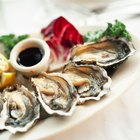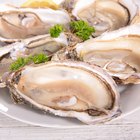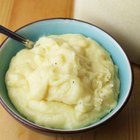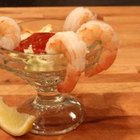
Scalloped oysters make a salty, creamy and crunchy treat. The dish -- usually made with a combination of butter, cracker crumbs, wine, mustard, cream and fresh oysters -- can't be prepared too far in advance. Oysters in particular can turn bad relatively quickly. However, making scalloped oysters a day or two ahead should be possible if you store the mixture correctly.
Oyster Safety
Oysters can cause food poisoning if not handled or stored properly. Shucked oysters keep safely in a refrigerator set to 40 degrees Fahrenheit for just 1 to 2 days, according to the USDA. If you prepare scalloped oysters ahead and store it in the refrigerator, it's best to do so the night before you serve it. If you leave it much longer, the dish may taste bad and may even pose a health risk.
Cook and Store
It's safer to cook scalloped oysters before refrigerating. This involves mixing the freshly shucked oysters with the rest of the ingredients and cooking in a heavy frying pan. Spread the cooked mixture into a deep baking tray, with no more than two layers of oysters to ensure all of the shellfish cooks evenly. Cook for around 20 minutes, depending on the recipe and tray size. Scalloped oysters usually have a crumbed breadcrumb and cracker topping, but it's best to add this when reheating just before serving.
Storage and Reheating
Once cooked, transfer your scalloped oysters to the refrigerator as quickly as possible. Never leave food out for longer than two hours before refrigerating. Cover the dish with aluminum foil or a tight lid. When you're ready to reheat the food, cook it until it reaches 145 F in the center; according to the FDA, this is the minimum internal temperature necessary for safety's sake. This typically means baking for at least 10 minutes in an oven set to 450 F.
Freezing Your Oysters
You can freeze and keep scalloped oysters for 3 to 4 months before thawing and reheating. Just transfer the mix to a sealable plastic container. However, don't expect the same light, crunchy taste of a fresh batch; frozen oysters tend to turn soft and gooey, and so do the cracker crumbs in the topping. If you choose to freeze scalloped oysters, do so before adding the crumbed topping; otherwise, you'll end up with a mushy dish.
Related Articles

Freezing a Moussaka
How Long Does It Take for ...

Does Caviar Go Bad?

How to Serve Cannoli

Can You Eat an Egg That's Been Frozen?

Can You Freeze Casseroles With ...

Can You Freeze Raw Oysters?

How Long Do Shucked Oysters Stay Fresh?

How Early Can You Make a Wedding Cake?

How Fast Does Cooked Spaghetti Squash ...

How to Bake Frozen Spanakopita

How Do I Freeze Stuffed Shells?

How to Cook Oysters on the Stove

How to Make Cornmeal Polenta

How to Make Homemade Mac & Cheese

How Long Can You Refrigerate Nacho ...

How to Make Shrimp Cocktail

How Long to Bake a Pre-Cooked Frozen ...

How Do I Cook Frozen Crabcakes?
Can You Freeze Eggplant Parmesan After ...
References
Writer Bio
Based near London, U.K., Peter Mitchell has been a journalist and copywriter for over eight years. Credits include stories for "The Guardian" and the BBC. Mitchell is an experienced player and coach for basketball and soccer teams, and has written articles on nutrition, health and fitness. He has a First Class Bachelor of Arts (Hons.) from Bristol University.
Photo Credits
Jupiterimages/Goodshoot/Getty Images